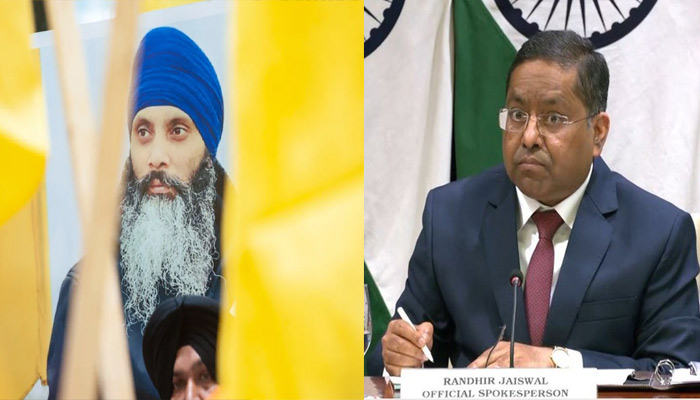Canada has informed Indian authorities about the arrest of three Indian citizens for the killing of pro-Khalistan activist Hardeep Singh Nijjar.
But is yet to provide any “specific or relevant evidence” regarding the case, external affairs ministry spokesperson Randhir Jaiswal said on Thursday. The two countries are currently engaged in discussions on issues such as the activities of pro-Khalistan elements and threats against Indian diplomats in Canada, Jaiswal acknowledged at a regular media briefing.
The developments come against the backdrop of a marked downturn in bilateral ties following Canadian Prime Minister Justin Trudeau’s allegation last September that Indian government agents were linked to the killing of Nijjar, who was gunned down outside a gurdwara in the Vancouver suburb of Surrey in June 2023. India has dismissed the accusation as “absurd” and maintained that Canada has shared no evidence to back up the allegation.
Last Friday, Canadian police announced the arrest and charging of the three Indians – Karanpreet Singh, 28, Kamalpreet Singh and Karan Brar, both 22 – for the murder of Nijjar and said they were probing whether the men had ties to the Indian government.
“Canada has informed us about the arrests…We have been informed that three people have been arrested, and they happen to be Indian nationals,” Jaiswal said in response to questions. He added that “no formal communication” on the matter had reached the Indian side.
“Let me first make it clear that no specific or relevant evidence or information has been shared by the Canadian authorities till date. You will, therefore, understand our view that the matter is being pre-judged,” he said.
Pointing out that “political interests” are at work, Jaiswal said India has maintained that “separatists, extremists, and those advocating violence have been given political space in Canada”.
Indian diplomats have been threatened with impunity and obstructed from performing their duties, and the Indian side has informed Canadian authorities that figures associated with organised crime and with links to India have been “allowed entry and residency in Canada”.
Jaiswal also said many of India’s extradition requests are pending. At the same time, he acknowledged the two countries are having discussions at the diplomatic level on all these matters.
India’s high commissioner to Canada, Sanjay Verma, too had said at an event held at the Montreal Council on Foreign Relations on May 7 that the two countries are using diplomatic channels “not open to the public” to try and find solutions to issues of concern to both sides. Verma also said national security threats emanating from Canada and the pro-Khalistan activities of Canadian citizens are the “two red lines” for India.
This is perhaps the first time that the Indian side has acknowledged these discussions. However, bilateral ties continue to be at an all-time low. The Canadian deputy high commissioner was summoned to the external affairs ministry last month for a protest over pro-Khalistan slogans being raised at an event in Toronto that was attended by Trudeau. New Delhi also reacted strongly to a Khalsa Day parade at Malton on May 5 that depicted the Indian premier in chains and within a cage.
Asked specifically about the possibility of India getting consular access to the three Indians arrested in Canada, Jaiswal said this would depend on the norms for such access. Countries have different norms for consular access, and in some nations, it is up to the apprehended citizen to make a request for consular access to their embassy, he said.
“If the [arrested] person doesn’t ask for consular access, the other country doesn’t bring it to our notice,” Jaiswal said, adding no “suo moto action” can be taken.

